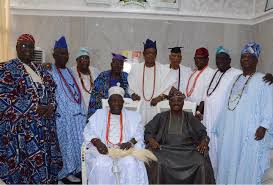The violence stands condemned as an unacceptable means of resolving conflict
As part of efforts to prove that his influence endures in spite of the recent coronation of 21 new kings within his domain, the Olubadan of Ibadan, Oba Saliu Adetunji recently proceeded with the scheduled installation of new Mogajis of the ancient city. But the ceremony, which took place despite the request of the state government for its postponement, suffered an attack by yet to be identified gun-wielding hoodlums. Mercifully, no life was lost.
The violence, however, stands condemned as an unacceptable means of resolving conflict. The security agencies and the Oyo State government must, therefore, fish out and punish its perpetrators so as to deter other citizens who might be similarly inclined to take the law into their own hands. Meanwhile, the violence did not come as a surprise, given what had transpired in the days preceding the ceremony. It had its roots in the Olubadan’s objection to the review of the 1957 Olubadan Chieftaincy Declaration by the Oyo State government and the eventual promotion of 33 high chiefs and Baales to the status of Oba (king).
On August 21, Oyo State Governor, Abiola Ajimobi, had installed 21 of the newly promoted kings at an elaborate ceremony. But the Olubadan had objected to both the event and the review that necessitated it on the ground that it was an unlawful incursion into the chieftaincy traditions of the ancient city.
He insisted that the body authorised to undertake any review, if necessary, was the Olubadan-in-Council, consisting of himself and 11 other high chiefs, and not the state government. In reality, however, the Olubadan’s chief concern was that the review could potentially erode his authority as the paramount ruler of Ibadan, which has 11 of the state’s 33 local councils.
Initially backed by the Olubadan-in-Council, Oba Adetunji sustained his objection until the state government in May this year instituted a judicial commission of enquiry to consider requests for the review of the Olubadan Chieftaincy Declaration. The commission, which considered 118 memoranda, 91 of them requesting for additional beaded crowns, while 27 others asked for the review of the ascendancy into the Olubadan stool, recommended the promotion of the 11 high chiefs and 21 ancient Baales from the suburbs of the city to Obas (kings).
With the acceptance of the recommendations by the governor, Oba Adetunji’s objection collapsed as eight of his high chiefs, with the prospect of becoming Obas, crossed carpet to the side of the government, effectively leaving him high and dry. With two others dead, and only one, the Osi Olubadan and former Governor, Rasheed Ladoja, standing with him, the Olubadan found himself in an awkward opposition as a vote in the Olubadan-in-Council would have produced an unpalatable outcome.
Surrounded by educated, wealthy and politically savvy high chiefs who have now been elevated to the position of king, the Olubadan’s choices are limited within the context of the politics of the review in relations to the advantage it has conferred on the Ibadan chieftaincy system. With 33 kings, Ibadan becomes the dominant player in Oyo State Council of Traditional Rulers and Chiefs and could force any decision almost to the exclusion of other towns in the state.
Having read his game very well, the governor, who is also an Ibadan indigene, has successfully outmanoeuvred his monarch, Oba Adetunji and his lone supporter, Ladoja, although both have since approached the courts for redress.
Hopefully, the judiciary would speedily look into the matter and determine the legality of the review of the 60-year- old declaration, which the state government claims it has authority to undertake under its chiefs and chieftaincy law. But while that is on, all the combatants must allow peace to reign in the Oyo State capital city.
CULLED FROM medium.com/OYOSTATEGOVERNMENT



